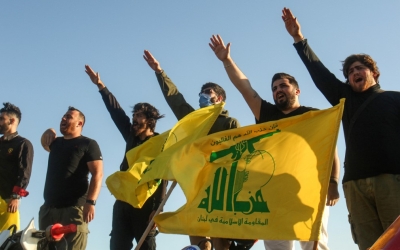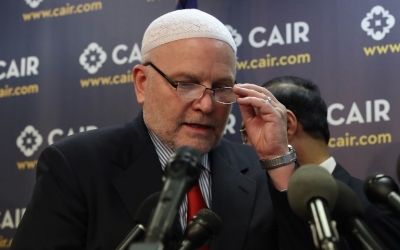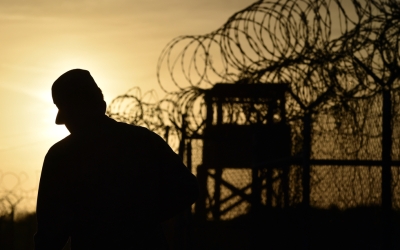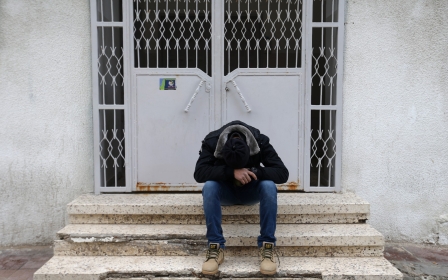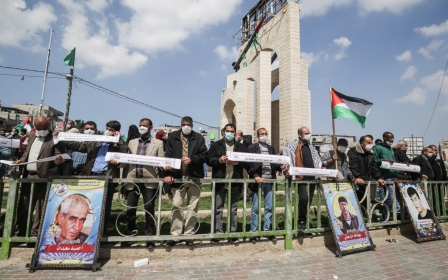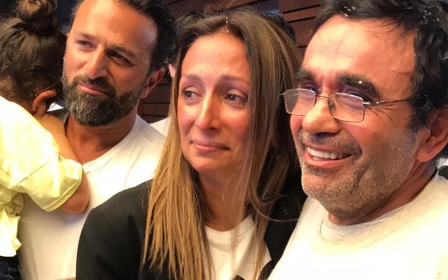'Why would you not allow him out?': Fears grow for Palestinian American held at virus-ravaged prison
When coronavirus began tearing through the Seagoville federal prison in Texas, Sarah Abdulqader expected the worst, having little faith in the American justice system's willingness to keep inmates such as her father safe and healthy.
Sarah's father, 60-year-old Mufid Abdulqader, was controversially accused after the 9/11 attacks of using the Holy Land Foundation (HLF), a Muslim charity, as a front to send funds to Hamas, a Palestinian political party designated a terrorist organisation by the US since 1995.
Abdulqader has denied all terror-financing charges levied against him, insisting he was only a fundraising volunteer at the then-12-year-old charity, which, before the allegations, was not blacklisted by any government.
Those critical of his conviction said the government's targeting of the HLF was just another example of pervasive anti-Muslim sentiment that consumed the US judiciary after the 9/11 attacks.
Abdulqader has already completed 14 years of his 20-year sentence, but is unable to appeal his conviction. His only chance of early release had been a presidential pardon. With Covid-19 spreading inside the Seagoville prison, his family had hoped to receive a compassionate release waiver or home confinement approval to get Abdulqader out of jail before he contracted the virus.
New MEE newsletter: Jerusalem Dispatch
Sign up to get the latest insights and analysis on Israel-Palestine, alongside Turkey Unpacked and other MEE newsletters
'They've let rapists, people who've committed sexual assaults, out on compassionate release and obviously they're a greater threat to society. Why would you not allow him out?'
- Sarah Abdulqader, daughter of Mufid
"You know, you always have this hope that justice will be delivered. But at the same time, we've seen it shut in our face so many times," Sarah told Middle East Eye in a phone interview.
Abdulqader's compassionate release request was denied, and it was not long before he called home saying he didn't feel well. He'd developed flu-like symptoms, but wasn't being isolated. So many in the prison had already contracted the virus, there was no way to demand a test.
Finally, about two weeks after feeling sick, Abdulqader was tested and informed he had contracted the virus, Sarah said.
"My biggest worry then was that I was just going to get a phone call saying that he'd died because there's nobody there to advocate for him," Sarah said.
Instead, she got a call informing her that her father had been transferred to the hospital wing. He was having trouble breathing and his blood pressure had risen dangerously high.
Sarah said she was not surprised that her father had contracted Covid-19, as she had been closely watching news reports since the early days of the pandemic on how the virus was spreading through several US prisons.
The federal Bureau of Prisons (BOP) declined to comment on Abdulqader's case, but at least 75 percent of the 1,750 prisoners at Seagoville, the hardest-hit federal prison in the US, have been infected, according to BOP data. At least three inmates there have died. Twenty-eight of roughly 300 Seagoville employees have also contracted the disease.
It's been more than a month since Abdulqader tested positive. Sarah says her father is doing well for now, though he is still being detained in the hospital wing, as the prison struggles to deal with its high rate of infection.
Campaign for compassionate release
Since Abdulqader has completed 14 years of his 20-year sentence with good behaviour, Sarah still hopes that the prison might agree to release her father early, but recognises chances are slim.
"I don't want to say you don't have hope, but you're apprehensive to believe that they would actually do it because basically the warden at the prison, she told us like, 'hey, I know, you meet the requirements, but I'm not going to approve it'," Sarah said.
Still, human rights groups including the Coalition for Civil Freedoms and the Samidoun Palestinian Prisoner Solidarity Network have been rallying, holding webinars and encouraging activists to write letters to demand Abdulqader be freed.
"They've let rapists, people who've committed sexual assaults, out on compassionate release and obviously they're a greater threat to society. Why would you not allow him out?," Sarah lamented.
"Obviously we protest [his charges], his innocence is always insisted, but even if they want to look at the actual crime he's convicted of, it's not a violent crime, right? So then why would they allow rapists and people who really are a threat to people - why would they let them out and not somebody who has a non-violent crime out?"
There are two early release pathways for federal inmates during the pandemic. Prisoners can be evaluated for home confinement, which is granted based on categories such as age, risk factors for Covid-19, the seriousness of their offence and their behaviour in prison.
At least 7,477 prisoners have been released to home confinement nationwide since March, according to data released by the BOP.
Prisoners can also be granted compassionate release with a reduced sentence to time served. About 900 inmates have been released on those grounds since the start of the pandemic.
Nationally, 11,328 prisoners, a quarter of those tested, have contracted coronavirus.
"They did very little to stop the spread," Sarah said, relaying information received from her father.
"Basically, where my dad is, it took them weeks to even pass out masks and, you know, they're in an enclosed area, they're breathing the same air, they're using the same stuff."
'Trial was politicised'
Whether Abdulqader is released early or has to wait six more years until his sentence has expired, Sarah said she is uncertain what life will look like for her father as a free man with a terror-financing conviction.
Before Abdulqader's imprisonment, he worked as a Dallas Public Works and Transportation Department engineer whose leadership on a $4.8m redevelopment project in 2001 won him commendations from then-Dallas Mayor Laura Miller.
Before his arrival in the US in the early 1980s, Abdulqader, a Palestinian with US citizenship, lived in Kuwait with his family, including his half-brother, Khaled Meshaal, a leader in the Hamas movement. That family link was used against Abdulqader at trial, leading critics to accuse prosecutors of pushing guilt by association.
"The trial was just so politicised," Sarah said. "They would bring pictures of suicide bombings and bus bombing, and it's like, what does that have to do with a group [the HLF] that, you know, founded hospitals and gave wheelchairs and donated backpacks?
"Our whole trial was basically the Palestinian-Israeli conflict and you just don't win in American culture with that, there's just too much bias," she said.
Sarah said her father was known as a family man who had a hobby of performing traditional Palestinian revolutionary songs with a group of musicians at community functions. The lyrics of the songs he sang were also used as evidence against him.
After his first case in 2007 resulted in a mistrial, Abdulqader was convicted a year later on an appeal launched by prosecutors. The charges were all related to his volunteer work at the HLF, a charity founded in 1989 that had been focused on getting medical care and humanitarian aid to impoverished Palestinians via "zakat committees".
None of the zakat (charity) committees that were mentioned in the indictment were listed in any designated terrorist list by any United States agency. In fact, USAID, a government agency, had been providing funding to the same zakat committees that were listed in the indictment and continued to do so long after the HLF was shut down. The United Nations, Red Cross and several other international aid groups had also supported the same zakat committees.
In December 2001, just after the attacks on the World Trade Center, the FBI raided the foundation and the homes of several employees and volunteers associated with the charity.
The foundation, accused of sending "material support" in the form of humanitarian aid to Hamas, was shut down amid the whirlwind of anti-Muslim post-9/11 policy moves, and five men with links to the charity were charged and put on trial.
After winning the first trial and losing the second, HLF president and CEO Shukri Abu-Baker and chairman Ghassan Elashi were each sentenced to 65 years imprisonment, while New Jersey office director Abdulrahman Odeh and California office director Mohammad El-Mezain got 15 years. Abdulqader, a volunteer fundraiser, was not an employee of the foundation.
British MP George Galloway called the case "one of the most monstrous injustices in modern times in America".
The American Civil Liberties Union objected to the way the government had handled the case, particularly its uncensored publication of "an astonishing" 246 names of people and organisations that were listed as "Unindicted Co-conspirators and/or Joint Venturers", including the Islamic Society of North America (ISNA) and the North American Islamic Trust (NAIT).
The case was highly controversial, in that most of the evidence used to convict them had been gathered by the Israeli government, which for years before 9/11 had been lobbying the US government to shut down HLF, to no avail.
Several Israeli expert witnesses testified with anonymity, a practice seldom used in American courts as the Sixth Amendment guarantees that a person accused of a crime has the right to confront a witness against them. The experts were not technically witnesses, and allowing them to testify anonymously was disputed.
Defence lawyers say every document used to build the case was translated from Arabic to Hebrew and then to English. In many instances, defence attorneys said their own Arabic translators documented mistranslations within the paperwork.
New evidence: Motion to vacate
In 2013, a motion filed in federal district court in Texas argued that the HLF defendants should be exonerated of all charges and have their sentences vacated on the basis of new evidence.
The motion, which was not approved, argued that there was no factual basis to the government's claims that Hamas controlled the zakat committees listed in the indictment and that the testimony of the government's witnesses relied on "pure speculation".
"Neither the government [n]or the defense presented any testimony from any person with actual personal knowledge as to how the committees operated that would have addressed the question of whether Hamas controlled the committees," the motion stated.
The motion also showed that the HLF, the largest Islamic charity in the US at the time, and other American Muslim organisations, met with the US Department of Treasury to seek guidance shortly after Hamas was designated a terror group in January 1995. Following the meeting, the government declined to provide the groups with a "white list" of acceptable charities.
"These facts establish that the HLF defendants were attempting to comply with the law and that the government deliberately misled them into thinking they were doing so. This demonstrates no offense would have been committed but for the government’s conduct," the motion stated.
"An examination of the evidence, with a proper application of the law, will show that Hamas did not control these committees any more than the fact that a person is a member of the Republican party, and is an officer of Walmart, means that the Republican party controlled Walmart. The evidence simply shows that Zakat Committees were composed of community leaders, some of whom were Hamas sympathisers and some of whom were not," the motion stated.
The motion also claimed what many in human rights circles have argued for years: "The defendants in the Holy Land Foundation case were prosecuted for one reason, and one reason only: that they are Muslim."
Middle East Eye delivers independent and unrivalled coverage and analysis of the Middle East, North Africa and beyond. To learn more about republishing this content and the associated fees, please fill out this form. More about MEE can be found here.


